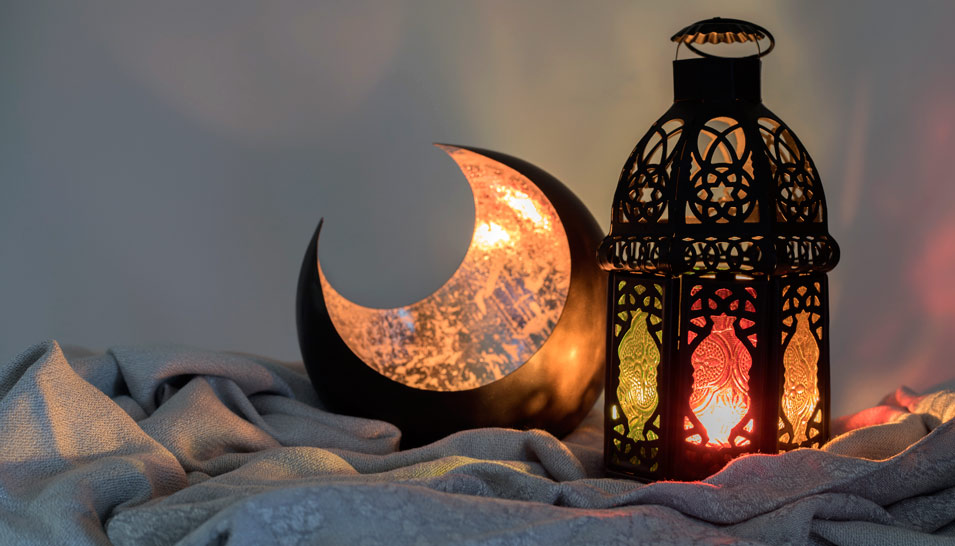
© Aramco Services Company / all rights reserved / reprinted with permission. Written by Fuad Rayess.
Through a break in the clouds a ray of moonlight filtered through and flickered briefly in the sky. Below, one of a group of men scanning the skies over Mecca saw it and pointed excitedly. "There it is," he said. "It is at hand!"
The others looked with excitement and saw it too. A few minutes later, before the religious leaders of the city, they testified to what they had seen. "The new moon is at hand," they said. "We have seen it." The leaders accepted the testimony and soon, from a hillside overlooking Mecca, a cannon boomed, the thunder of its report and the flash of flame from its muzzle announcing to the Muslim faithful that Ramadan, the most sacred period of the Muslim year, was over and that 'Id al-Fitr, the second most important day in the Islamic year, could begin.
'Id al-Fitr, "the festival of breaking the fast," is also called "The Little 'Id,"—to distinguish it from "The Big 'Id," the al-Adha holiday, which starts at the end of the period of pilgrimage and during which Muslims unable to actually go on pilgrimage participate spiritually in the rituals. The description does not in any way signify inferiority. As the climax to the exacting, month-long fast, it is one of the most important days on the Islamic religious calendar. It is a time of triumph, a time for rejoicing that the long struggle of the spirit with the flesh is over and that now, with an easy conscience, the flesh may be appeased.
Because the 'Id is such an important day, preparations begin early and usually involve much shopping, for it is customary that each member of most families, especially children, will have new clothes for the occasion and new shoes. Indeed, for the merchants in the cloth suqs it is the busiest time of the year. They usually stock up on all the cloth they can reasonably expect to sell before the 'Id and most shops offer everything from Egyptian cotton to English wool in all patterns and colors. In recent years stores that sell ready-made clothing also have begun to thrive, and so, busily fitting and measuring customers, have tailors. Candy merchants are particularly busy too and most begin to stock assortments of colored candies and chocolate bars long before the holiday arrives.
Toward the end of Ramadan the pressures of the fast become intense and it is with more than passing interest that the faithful, during that final week, scan the sky for the sight of the new moon. Women keep a specially close watch on the sky as they hurry to finish the new garments, sweep and scrub their homes, beat the rugs and bring out white starched seat covers for chairs.
When, at last, the thunder of the cannon comes, the tension collapses and with cheers and congratulations the faithful fall upon their feasts, eating and drinking with gusto. On the following day most people, even though tired from the festivities, rise early in anticipation of a happy holiday. The children are particularly eager on this day because they expect their fathers to bestow on them that rarest of gifts, some pocket money of their own to spend as foolishly, as extravagantly as they please. As for the men—once they have dispensed this largesse—they proceed to the mosque to offer the 'Id prayer and, afterward, to exchange hearty greetings with acquaintances and friends. At noon they return home to have lunch, usually with relatives and friends, and to await the visits of friends. This first day is, in fact, reserved for those exchanges of visits and greetings. Many, however, go to parks or to small roadside carnivals for rides on smaller versions of the Western Ferris wheels or carousels, and similar amusements. The children also ignite firecrackers and the glitter of sparklers, the popping of salutes and the soaring glow of rockets gleam and echo through towns and cities from dawn until late into the night. With nightfall, tongues of flame from great bonfires flicker from hillsides and vacant lots and even the tops of buildings. In countries where the 'Id is a longer festival, the celebrations are most elaborate. In Saudi Arabia, for example, where the 'Id is a one-week holiday, bands of men armed with swords dance the national 'Ardah—once a war dance—in the streets and sing to the beat of drums as children cluster around with round admiring eyes.
But however it is observed the 'Id is a day of joy, one awaited each year with reverence and with pleasure by millions of devout Muslims throughout the world.
This article appeared on page 21 of the January/February 1966 print edition of Saudi Aramco World. Fuad Rayess is General Supervisor of the Arabic Press and Publications Division in the Public Relations Department of the Arabian American Oil Company in Dhahran.